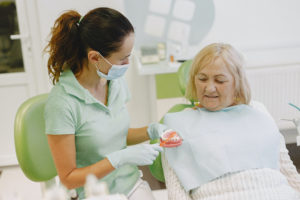 Advancements in materials and technologies allow dentures to feel and look more realistic than ever before. A well-fitting set of dentures only needs suction to stay in place. If your lower denture keeps slipping or moving from position, it can make it difficult to eat, laugh, or speak without worrying about your teeth falling out. If your bottom denture is giving you grief, here are 3 of the most common causes and what you can do to stop the slipping.
Advancements in materials and technologies allow dentures to feel and look more realistic than ever before. A well-fitting set of dentures only needs suction to stay in place. If your lower denture keeps slipping or moving from position, it can make it difficult to eat, laugh, or speak without worrying about your teeth falling out. If your bottom denture is giving you grief, here are 3 of the most common causes and what you can do to stop the slipping.
1. A Flat Ridge
Tooth loss causes your jaw bone to deteriorate slowly. You can lose up to 25% of your jaw’s density within the first year of losing a tooth. It will continue to shrink as more time passes, even with dentures. The changes can cause a flat or negative ridge from bone loss. You may not have enough bone to support your denture.
2. Dentures Aren’t Aligned Properly
The relationship between your upper and lower teeth is important for your bite. If your top and bottom dentures don’t rest on one another correctly, it can move your denture from position. It can also affect your ability to chew certain foods, which may cause you to eliminate them from your diet. Over time, this can lead to nutritional deficiencies that can harm your health.
3. Denture Needs to be Relined
Your facial structures change over time. Your dentures won’t adapt to the changes, which is why it’s important to have them relined regularly. If it has been a while since you’ve had some adjustments, it’s not unusual for your denture to slip or cause irritation.
A dental adhesive can help hold your teeth in place and provide extra stability. However, you don’t want to rely on it long-term. It’s best to contact your dentist to determine why your dentures are slipping and what can be done to restore a snug fit, like an adjustment or a replacement.
Stop Dentures from Slipping Permanently
If you’re ready to stop slipping and irritation for good, dental implants may be the solution for you. A dental implant replaces the entire tooth structure, including the root.
Your dentist can insert 4 to 10 dental implants into your jaw to stabilize your denture. Your bone will fuse to the implants through a process called osseointegration, providing unmatched support and stability. You can regain up to 70% of your natural biting force.
Not to mention, dental implants have over a 95% success rate and are proven to last for 30 years or more with the correct care, like brushing and flossing. You can laugh, smile, and enjoy your favorite foods without worrying about your denture falling out.
About Dr. Ashley Civetti
Dr. Civetti earned her dental degree from the University of Texas Health Science Center School of Dentistry and has regularly continued her education in many specialties. She is a proud member of many professional organizations, like the American Dental Association. If your dentures are slipping, request an appointment through our website or call (561) 220-8976.
